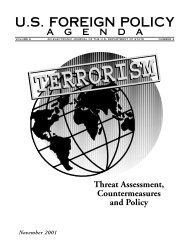s. history us history us history - Embassy of the United States
s. history us history us history - Embassy of the United States
s. history us history us history - Embassy of the United States
- No tags were found...
You also want an ePaper? Increase the reach of your titles
YUMPU automatically turns print PDFs into web optimized ePapers that Google loves.
CHAPTER 14: THE NEW CONSERVATISM AND A NEW WORLD ORDEROUTLINE OF U.S. HISTORYrevolutionaries calling <strong>the</strong>mselvesSandinistas overthrew <strong>the</strong> repressiveright-wing Somoza regime andestablished a pro-Cuba, pro-Sovietdictatorship. Regional peace effortsended in failure, and <strong>the</strong> foc<strong>us</strong> <strong>of</strong>administration efforts shifted tosupport for <strong>the</strong> anti-Sandinista resistance,known as <strong>the</strong> contras.Following intense political debateover this policy, Congress ended allmilitary aid to <strong>the</strong> contras in October1984, <strong>the</strong>n, under administrationpressure, reversed itself in <strong>the</strong>fall <strong>of</strong> 1986, and approved $100 millionin military aid. However, a lack<strong>of</strong> success on <strong>the</strong> battlefield, charges<strong>of</strong> human rights ab<strong>us</strong>es, and <strong>the</strong> revelationthat funds from secret armssales to Iran (see below) had beendiverted to <strong>the</strong> contras undercutcongressional support to continuethis aid.Subsequently, <strong>the</strong> administration<strong>of</strong> President George H.W. B<strong>us</strong>h,who succeeded Reagan as presidentin 1989, abandoned any effort tosecure military aid for <strong>the</strong> contras.The B<strong>us</strong>h administration also exertedpressure for free elections andsupported an opposition politicalcoalition, which won an astonishingupset election in February 1990,o<strong>us</strong>ting <strong>the</strong> Sandinistas from power.The Reagan administration wasmore fortunate in witnessing a returnto democracy throughout <strong>the</strong>rest <strong>of</strong> Latin America, from Guatemalato Argentina. The emergence <strong>of</strong>democratically elected governmentswas not limited to Latin America; inAsia, <strong>the</strong> “people power” campaign<strong>of</strong> Corazón Aquino overthrew <strong>the</strong>dictatorship <strong>of</strong> Ferdinand Marcos,and elections in South Korea endeddecades <strong>of</strong> military rule.By contrast, South Africa remainedintransigent in <strong>the</strong> face <strong>of</strong>U.S. efforts to encourage an end toracial apar<strong>the</strong>id through <strong>the</strong> controversialpolicy <strong>of</strong> “constructive engagement,”quiet diplomacy coupledwith public endorsement <strong>of</strong> reform.In 1986, fr<strong>us</strong>trated at <strong>the</strong> lack <strong>of</strong>progress, <strong>the</strong> U.S. Congress overrodeReagan’s veto and imposed a set <strong>of</strong>economic sanctions on South Africa.In February 1990, South AfricanPresident F.W. de Klerk announcedNelson Mandela’s release and began<strong>the</strong> slow dismantling <strong>of</strong> apar<strong>the</strong>id.Despite its outspoken anti-Communistrhetoric, <strong>the</strong> Reagan administration’sdirect <strong>us</strong>e <strong>of</strong> militaryforce was restrained. On October25, 1983, U.S. forces landed on <strong>the</strong>Caribbean island <strong>of</strong> Grenada afteran urgent appeal for help by neighboringcountries. The action followed<strong>the</strong> assassination <strong>of</strong> Grenada’sleftist prime minister by members<strong>of</strong> his own Marxist-oriented party.After a brief period <strong>of</strong> fighting, U.S.troops captured hundreds <strong>of</strong> Cubanmilitary and construction personneland seized caches <strong>of</strong> Soviet-suppliedarms. In December 1983, <strong>the</strong> lastAmerican combat troops left Grenada,which held democratic electionsa year later.The Middle East, however, presenteda far more difficult situation.A military presence in Lebanon,where <strong>the</strong> <strong>United</strong> <strong>States</strong> was attemptingto bolster a weak, but moderatepro-Western government, endedtragically, when 241 U.S. Marineswere killed in a terrorist bombing inOctober 1983. In April 1986, U.S.Navy and Air Force planes strucktargets in Tripoli and Benghazi,Libya, in retaliation for Libyaninstigatedterrorist attacks on U.S.military personnel in Europe.In <strong>the</strong> Persian Gulf, <strong>the</strong> earlierbreakdown in U.S.-Iranian relationsand <strong>the</strong> Iran-Iraq War set <strong>the</strong>stage for U.S. naval activities in <strong>the</strong>region. Initially, <strong>the</strong> <strong>United</strong> <strong>States</strong>responded to a request from Kuwaitfor protection <strong>of</strong> its tanker fleet; buteventually <strong>the</strong> <strong>United</strong> <strong>States</strong>, alongwith naval vessels from Western Europe,kept vital shipping lanes openby escorting convoys <strong>of</strong> tankers ando<strong>the</strong>r neutral vessels traveling upand down <strong>the</strong> Gulf.In late 1986 Americans learnedthat <strong>the</strong> administration had secretlysold arms to Iran in an attempt toresume diplomatic relations with <strong>the</strong>hostile Islamic government and winfreedom for American hostages heldin Lebanon by radical organizationsthat Iran controlled. Investigationalso revealed that funds from <strong>the</strong>arms sales had been diverted to <strong>the</strong>Nicaraguan contras during a periodwhen Congress had prohibited suchmilitary aid.The ensuing Iran-contra hearingsbefore a joint Ho<strong>us</strong>e-Senatecommittee examined issues <strong>of</strong> possibleillegality as well as <strong>the</strong> broaderquestion <strong>of</strong> defining American foreignpolicy interests in <strong>the</strong> MiddleEast and Central America. In alarger sense, <strong>the</strong> hearings were a constitutionaldebate about governmentsecrecy and presidential vers<strong>us</strong> congressionalauthority in <strong>the</strong> conduct<strong>of</strong> foreign relations. Unlike <strong>the</strong> celebratedSenate Watergate hearings 14years earlier, <strong>the</strong>y found no groundsfor impeaching <strong>the</strong> president andcould reach no definitive concl<strong>us</strong>ionabout <strong>the</strong>se perennial issues.U.S.-SOVIET RELATIONSIn relations with <strong>the</strong> Soviet Union,President Reagan’s declared policywas one <strong>of</strong> peace through strength.He was determined to stand firmagainst <strong>the</strong> country he would in1983 call an “evil empire.” Two earlyevents increased U.S.-Soviet tensions:<strong>the</strong> suppression <strong>of</strong> <strong>the</strong> Solidaritylabor movement in Poland inDecember 1981, and <strong>the</strong> destructionwith 269 fatalities <strong>of</strong> an <strong>of</strong>f-coursecivilian airliner, Korean AirlinesFlight 007, by a Soviet jet fighter onSeptember 1, 1983. The <strong>United</strong> <strong>States</strong>also condemned <strong>the</strong> continuing Sovietoccupation <strong>of</strong> Afghanistan andcontinued aid begun by <strong>the</strong> Carteradministration to <strong>the</strong> mujahedeenresistance <strong>the</strong>re.During Reagan’s first term, <strong>the</strong><strong>United</strong> <strong>States</strong> spent unprecedentedsums for a massive defense buildup,including <strong>the</strong> placement <strong>of</strong> intermediate-rangenuclear missilesin Europe to counter Soviet deployments<strong>of</strong> similar missiles. And onMarch 23, 1983, in one <strong>of</strong> <strong>the</strong> mosthotly debated policy decisions <strong>of</strong> his312313












